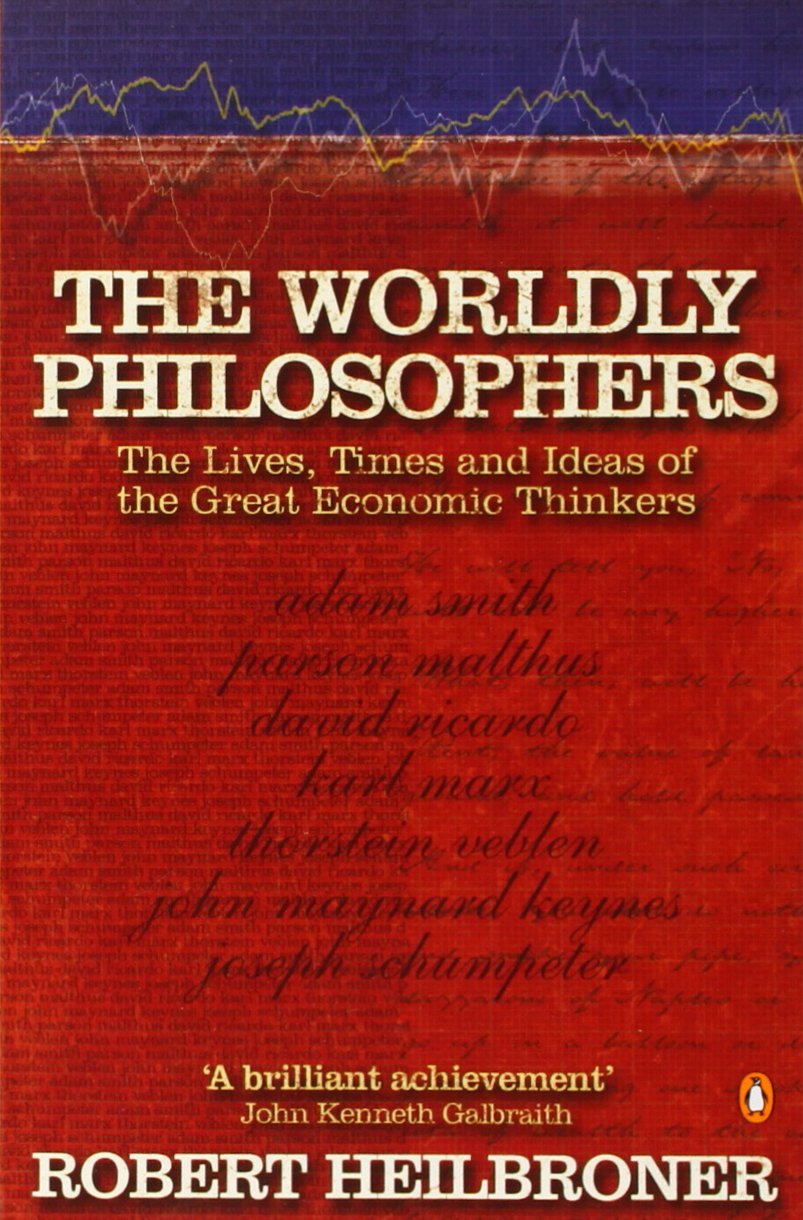About this deal
There are many familiar names on the list: Adam Smith, Friedrich Engels, Karl Marx, Maynard Keynes, John Stuart Mill, and Parson Malthus. But others were new (although they shouldn't be): David Ricardo, Robert Owen, Saint-Simon, Frederic Bastiat, Henry George, John A. Hobson, Alfred Marshall, Thorstein Veblen, and Joseph Schumpeter.
However, for all its shortcomings, I can confidently say that I gained a lot by reading The Worldly Philosophers. My favourite chapters were the ones on Marx and Thorstein Veblen. Moreover, there were countless observations and criticisms that I found fascinating and extremely pertinent to modern life. None of the three methods, or systems, exists in pure form. Systems practiced today in the United States, Great Britain, Japan, or the Soviet Union are better described as mixed economies, which contain elements of both the market economy and the planned economy. For example, within free enterprise there are obvious government-sanctioned monopolies, such as electric power companies, railroads, and communications systems. It strikes me that what most of these thinkers have in common is not economics, but sociology. A drive to explain what the human world is and how it functions, all of these writers I believe wrote, with the possible exception of Adam Smith, for political reasons broadly speaking, to either push for certain policies or wider cultural changes. Looking at them purely from the perspective of economic thinking is like looking at half and elephant and concluding that it must have walked upright on two legs and probably didn't need a head.Adam Smith, in fact, was neither pro-capital nor pro-labor. At the University of Glasgow, he was influenced by the concept of "the greatest happiness of the greatest number." Consequently, he avoided taking sides with any class, concerning himself with the promotion of wealth for all of England's classes. Thus, these two evolutionary laws form an endless chain for society through which progress is inevitable. Even though the Law of Population depresses wages toward a subsistence level, it never arrives there. Conditions steadily improve, resulting in further accumulation for further investment. What is the end result? Not a utopia, but the economy, if left alone, will ultimately reach its "promised reward" — a world where poverty and wealth balance each other. Perhaps, this passive state of affairs is a product of Social Democratic governments that intervene in Caterpillarism. Does it matter who appropriates the profit? Does it matter who subjugates the Worker? As long as the State purports to represent the whole of society, it’s OK?
For the first time, society revolved around the actions of ‘free-thinking agents’ who pursued their own ‘self-interest’, a thought previously heretical to the Catholic medieval elite for whom covetousness was a sin. The rational man was thus born. Rational, in this context, meant that a man would rather have more of a product than less of it. Thus, the age of accumulation began. Increasingly, a certain section of the society began to be accorded more power: namely the ‘capital’ists, or those who were of the firm and simple belief that ‘capital’ accumulated by amassing profits ought to be reinvested to generate more profits. Probably the nicest chapter is about Thorstein Veblen. His second book about the rise of the Engineers is even more interesting than his Theory of the Leisure Class. The chapter on Keynes is more focused on his personality, but I got the point. I did not see what merits Schrumpter a place in the pantheon however. Some catchy words, entrepreneurship, the swarm, scientific rational socialism etc. What emerges from this is a principle that profit itself is not intrinsically bad, at least if it is generated in the name of the State, which is presumably representative of the Workers’ interests. This is a great book. It still has not been equalled. It’s a run through where the classical economists came from, who they were, what they thought and why they thought what they thought and how they worked as a group to try to produce a more productive and peaceful and prosperous civilization. They regarded themselves as engaged in a holy mission to understand this commercial, and then later industrial, economy in which humanity was increasingly enmeshed and how to properly manage it. The book is truly wonderful. It still saddens me that no one has managed to write anything as good” Readmore...The surplus value created by its Workers is being aggregated by the State or State-owned Enterprises. the self-sufficiency of the nation through the utilization of raw materials from either England or her colonies
The Wealth of Nations, which resembles an encyclopedia, is far more than a mere textbook on economics. One critic calls it "a history and criticism of all European civilization." Among a host of topics, it discusses the origin and use of money, apprenticeship, statistics, waste, the military, foreign trade, landlords, the clergy, royalty, farming, and "the late disturbances in the American colonies."
Even if a Revolution has been avoided, the outcome is not the self-regulating equilibrium the Caterpillarists were seeking.
Shit happens in this system, but that’s like saying that football players occasionally do a hamstring.To comprehend fully why Smith's Wealth of Nations was a revolutionary book, one must know something of the economy and living conditions in England in 1776. The nation was entering the second of three stages of capitalism. It seems to me that these disputes about profits are effectively arguments about the relative entitlement to profit as between labor and capital. According to Smith, under the market system each worker freely chooses a trade. Through such a multitude of choices, society reaps the benefit of having all its necessary tasks filled. The individual, motivated by self-interest, selects a particular task. Competition for these tasks prevents the individual from over-charging society. Thus, the two laws of the market — self-interest and competition — react upon each other and form a balance, guaranteeing the survival of society.
Related:
 Great Deal
Great Deal 